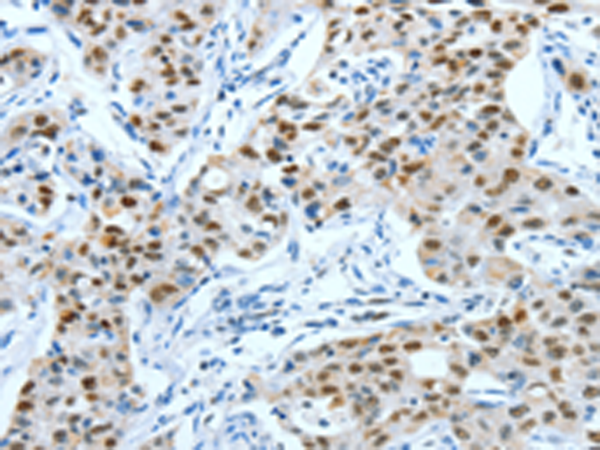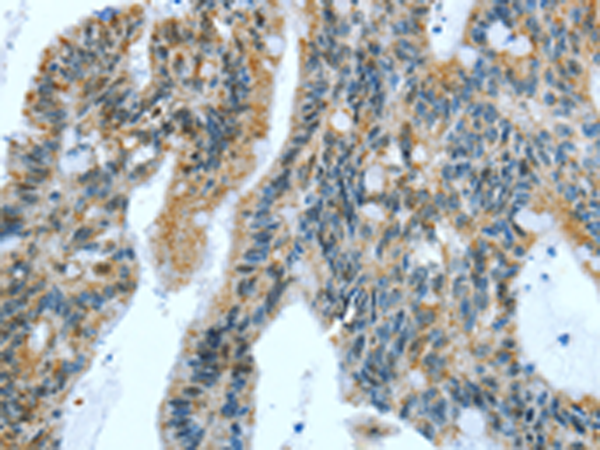

| WB | 咨询技术 | Human,Mouse,Rat |
| IF | 咨询技术 | Human,Mouse,Rat |
| IHC | 1/25-1/100 | Human,Mouse,Rat |
| ICC | 技术咨询 | Human,Mouse,Rat |
| FCM | 咨询技术 | Human,Mouse,Rat |
| Elisa | 1/2000-1/5000 | Human,Mouse,Rat |
| Aliases | AP1; AP-1; c-Jun |
| Host/Isotype | Rabbit IgG |
| Antibody Type | Primary antibody |
| Storage | Store at 4°C short term. Aliquot and store at -20°C long term. Avoid freeze/thaw cycles. |
| Species Reactivity | Human, Mouse, Rat |
| Immunogen | Fusion protein of human JUN |
| Formulation | Purified antibody in PBS with 0.05% sodium azide and 50% glycerol. |
+ +
以下是关于JUN抗体的模拟参考文献示例(仅供格式参考,非真实文献):
1. **文献名称**:*c-Jun Antibody Validation in Cancer Cell Lines*
**作者**:Smith, A. et al.
**摘要**:本研究验证了JUN抗体(克隆号#AB123)在多种癌细胞系中的特异性,通过Western blot和免疫荧光证实其在检测c-Jun蛋白及其磷酸化形式中的可靠性,并揭示了c-Jun过表达与肿瘤侵袭性的相关性。
2. **文献名称**:*JUN Antibody Application in Neuronal Injury Models*
**作者**:Li, X. & Chen, W.
**摘要**:利用JUN抗体(兔多克隆)研究大鼠背根神经节损伤后c-Jun的时空表达模式,发现损伤后24小时内c-Jun显著上调,提示其在神经再生中的潜在调控作用。
3. **文献名称**:*Comparative Analysis of Commercial JUN Antibodies for ChIP-seq*
**作者**:Johnson, R. et al.
**摘要**:系统评估了5种市售JUN抗体在染色质免疫沉淀(ChIP)中的效率,确定抗体#JUN-7H2适用于AP-1复合体的基因组定位研究,为相关表观遗传实验提供选择依据。
4. **文献名称**:*Role of c-Jun in Inflammatory Signaling: Insights from Knockout Models*
**作者**:Garcia, M. et al.
**摘要**:通过JUN抗体(小鼠单克隆)检测c-Jun在巨噬细胞中的表达,结合基因敲除技术,证实c-Jun通过调控IL-6分泌参与炎症信号放大机制。
---
**注意**:以上文献为示例性内容,实际引用时需查询真实数据库(如PubMed、Web of Science)获取权威信息。建议结合具体研究方向补充关键词(如“c-Jun antibody specificity”、“ChIP-seq validation”)进行精准检索。
The JUN antibody is a crucial tool in molecular and cellular biology research, specifically targeting the c-Jun protein, a component of the AP-1 (Activator Protein 1) transcription factor complex. c-Jun, encoded by the *JUN* gene, regulates gene expression by binding to AP-1 consensus DNA sequences, influencing processes like cell proliferation, differentiation, apoptosis, and stress responses. It is activated by mitogen-activated protein kinase (MAPK) pathways, particularly the JNK (c-Jun N-terminal kinase) pathway, in response to extracellular signals such as cytokines, growth factors, or cellular stress. Dysregulation of c-Jun is linked to cancer, inflammation, and developmental disorders, making it a focus in disease research.
JUN antibodies are widely used in techniques like Western blotting, immunohistochemistry (IHC), and immunofluorescence (IF) to detect c-Jun expression levels, localization, and activation states (e.g., phosphorylated forms). These antibodies aid in studying AP-1-mediated transcriptional regulation, oncogenic signaling, and drug response mechanisms. Researchers often validate JUN antibodies for specificity using knockout cell lines or siRNA-mediated gene silencing. Commercial variants are available in different host species (e.g., mouse, rabbit) and formats (monoclonal/polyclonal), with clone-specific performance variations. When selecting a JUN antibody, considerations include cross-reactivity with related proteins (e.g., JunB, JunD) and compatibility with experimental models. Its applications span cancer biology, immunology, and neuroscience, underscoring its versatility in decoding cellular signaling networks.
×